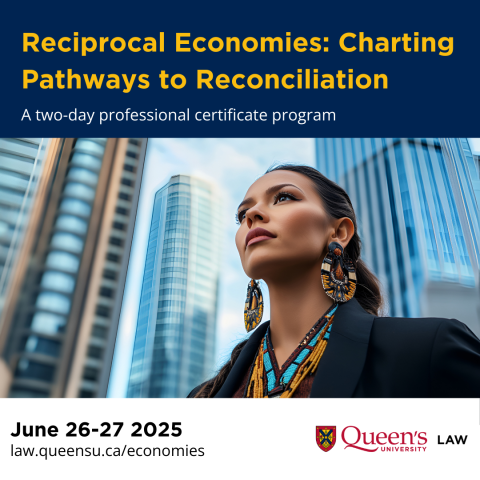
Queen’s Law is expanding its professional education offerings with the launch of the Reciprocal Economies: Charting Pathways to Reconciliation Certificate, an online program designed to build understanding and skills in Indigenous economic reconciliation across a range of professions. The certificate will run during National Indigenous History Month, on June 26 and 27.
“Economic reconciliation is critical at this juncture,” says program developer Stacia Loft, Law’20, Director of Indigenous Initiatives & EDII Programs at Queen’s Law and Deputy Grand Chief of the Association of Iroquois and Allied Indians. “Amplifying and supporting diverse and distinct economic opportunities for Indigenous Peoples – within and beyond First Nations communities – is reconciliation in action.”
Loft emphasizes that Indigenous Peoples must be equitably included at all levels of economic development, from planning through to project implementation, across both public and private sectors. “When Indigenous Peoples are meaningful and equal partners, it can lead to better outcomes for all,” she says.
Recent pressures on Canada’s economy have increased the urgency of development projects. In this context, Loft stresses the need for informed and principled engagement with Indigenous communities. “Now more than ever, consultation and free, prior, and informed consent must be obtained from First Nations at the outset – not treated as an afterthought or a checkbox in projects labelled as being of ‘national interest.’”
Participants in the certificate program will gain insight into legal frameworks, governance models, and economic practices that support reciprocal relationships between Indigenous and non-Indigenous communities.
The certificate is open to professionals across sectors – from law and government to finance, non-profits and public-private partnerships – and is designed for both lawyers and non-lawyers. “We’ve developed the program with diverse professions in mind]” Loft says. “Just as our instructors bring wide-ranging expertise, we welcome participants with varied perspectives and career backgrounds.”
Topics explored include legal and policy frameworks for consultation, Indigenous procurement strategies, and building and nurturing business partnerships. Participants will also engage with real-world case studies – such as the Ontario First Nations’ shareholder agreement with Hydro One.
“As demand grows for reconciliation efforts rooted in action, professional education plays a vital role,” says Loft. She points to Call to Action #92 of the Truth and Reconciliation Commission, which urges the corporate sector to adopt the United Nations Declaration on the Rights of Indigenous Peoples (UNDRIP) as a policy and operational framework. “Ten years after the TRC’s final report, it’s time to embed relationship-building and meaningful consultation as core functions in project development across all sectors.”
Instructors include leading legal practitioners, policy experts, and Indigenous community leaders:
- Sara Mainville, Law’04, Managing Partner, JFK Law
- Cherie Brant, Partner and National Leader of Indigenous Law, Borden Ladner Gervais LLP
- Sara Loft, Law’25, Principal, Tawi:ne Consulting
- Tabatha Bull, President and CEO, Canadian Council for Indigenous Business
- Saga Williams, Principal, AS Williams Consulting and Senior Advisor, External Relations, First Nations Major Projects Coalition
- Clint Davis, Vice-President of Aboriginal Affairs, TD Bank Financial Group
“This certificate will support staff, managers, and decision-makers already involved in or considering development on Indigenous lands,” Loft says. “By building an understanding of the barriers to Indigenous participation in the economy – and fostering principled approaches to reciprocity – we hope to help identify future opportunities with Indigenous partners.”
Registration is now open for the inaugural offering of the Reciprocal Economies Certificate, which will take place online June 26–27. The program is open to professionals from all sectors who want to contribute to reconciliation through economic development.
For lawyers practising in Ontario, this certificate program contains 4 EDI Professionalism and 0.5 Professionalism CPD hours and is also eligible for Substantive CPD hours.
For more information and to register, visit the Queen’s Law Reciprocal Economies: Charting Pathways to Reconciliation Certificate web page.